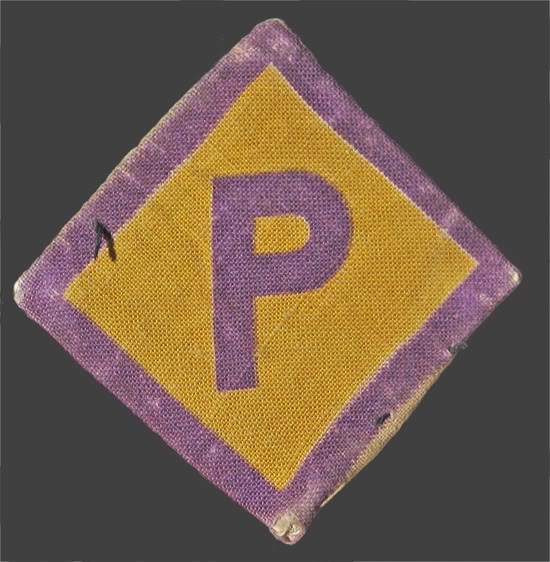Saturday 30 March 1940
 |
| The "P" badge that Polish workers in Germany must wear. |
The Soviets have some inkling about all this, perhaps from spies within one or both of the Allied governments. The Soviet authorities of the Soviet Transcaucasian Military District are conducting desk exercises on how to respond to such an attack. The plan is to start a counter-offensive toward Erzurum and Tebriz.
Plan Pike, while somewhat far-fetched and lacking political backing, is not complete fantasy. Today, as a test, a British reconnaissance plane - painted in civilian colors - flies from Iraq to the Soviet oil fields on the Absheron Peninsula and takes photographs. It attracts no Soviet notice.
Along the Swiss border, both Germany and France now have spotlights set up marking the Swiss border in order to avoid the accidental bombing of neutral Swiss towns. It is a rare example of wartime cooperation by opposing sides.
Battle of the Atlantic: Convoy SL 26 departs from Freetown.
U-122 (Korvettenkapitän Hans-Günther Looff) is commissioned.
French Government: French Minister of Defense Édouard Daladier is not in agreement with Operation Royal Marine, Winston Churchill's pet plan to mine the Rhine River. He persuades the French war cabinet to reject the operation. The British respond by threatening to suspend Operation Wilfred, the mining of Norwegian coastal waters.
British Government: British Shipping Minister Sir John Gilmour, 2nd Baronet passes away at age 63.
First Lord of the Admiralty Winston Churchill warns neutrals about the course of the war, which he expects to intensify.
The Ministry of Agriculture reports that the effort to bring more land into cultivation has resulted in 1,370,000 extra acres of tillage had been plowed, versus the overall target of 2,000,000 acres.
Turkey: The Turkish government shuts down Turkische Post, a German newspaper, in Istanbul.
China: The Japanese establish their puppet Chinese government in Nanking. Ching-wei, a former colleague and rival of Chiang Kai-shek with a long history in Nationalist politics, leads the government as President of the Executive Yuan and Chairman of the National Government. Such governments rarely have any power at all and generally, are ignored by foreign governments. They are used as propaganda devices until they are no longer needed, then discarded. The government's official name is Reorganized National Government of the Republic of China. The Japanese have been under severe military pressure since the opening of the Chinese Winter Offensive in late December, and feel this might help stabilize their reign.
The guiding principles of the new government are the Three Principles of pan-Asianism, anti-Communism, and opposition to Chiang Kai-shek. Ching-wei is in contact with the German and Italian governments and is interesting in joining the Tripartite Pact between Japan, Germany, and Italy, also known as the Axis.
On the battlefield, the Japanese at Wuyuan begin to retreat under pressure. The city does not yet switch hands. The Chinese 8th War Area attacks around Patzepu, Hsishantzu, Hsichiao, and Manko. The Chinese claim they have killed 3400 Imperial Japanese Army troops, but the Japanese respond that they actually have lost only 13 troops while killing 1500 Chinese.
There are Japanese air attacks on Chinn, Yushan, Shangjao, and Yingtanchen.
In a sign of the sacrifices being made by the Japanese people due to the China invasion, Japanese Prime Minister Mitsumasa Yonai visits children whose fathers have perished in China.
German Homefront: The Nazis are - as always - concerned with racial purity. There are 300,000 Polish workers in German factories. This causes concern about possible "mixing." From now on, they are required to wear a "P" badge or face 6-weeks imprisonment. While not the same as the Yellow Star of David being forced upon Jews in Poland, it is an attempt to reinforce the Poles' second-class status.
American Homefront: "When You Wish Upon a Star" by Ray Eberle & Glenn Miller, featured in the current Walt Disney animated film "Pinocchio," has the top spot in "Your Hit Parade." The film itself is lauded by critics but is encountering resistance at the box office.
Future History: Jerry Lucas is born in Middletown, Ohio. He becomes a key player on the championship New York Knicks basketball teams of the early 1970s and later becomes a memory education expert.
 |
| Prime Minister Mitsumasa Yonai visits children whose fathers have perished during the Japanese invasion of China. |
March 1940
March 1, 1940: Soviet Breakthroughs Past ViipuriMarch 2, 1940: Soviets Swarm West in Finland
March 3, 1940: Soviets Across Gulf of Viipuri
March 4, 1940: USSR Apologizes to Sweden
March 5, 1940: Katyn Forest Massacre Approved
March 6, 1940: Finns Head to Moscow
March 7, 1940: The Coal Ships Affair
March 8, 1940: Peace Talks Begin in Moscow
March 9, 1940: Soviets Harden Peace Terms
March 10, 1940: Germany Draws Closer to Italy
March 11, 1940: Winter War Peace Terms Finalized
March 12, 1940: War is Over (If You Want It)
March 13, 1940: Winter War Ends
March 14, 1940: Evacuating Karelia
March 15, 1940: The Bletchley Bombe
March 16, 1940: First British Civilian Killed
March 17, 1940: Enter Dr. Todt
March 18, 1940: Mussolini To Join the War
March 19, 1940: Daladier Resigns
March 20, 1940: Soviets Occupy Hango Naval Base
March 21, 1940: Paul Reynaud Leads France
March 22, 1940: Night Fighters Arise!
March 24, 1940: French Consider Alternatives
March 25, 1940: Reynaud Proposes Action
March 26, 1940: C-46 First Flight
March 27, 1940: Himmler Authorizes Auschwitz Construction
March 28, 1940: Allies Ponder Invading Norway
March 29, 1940: Soviets Prefer Neutrality
March 30, 1940: Allied Uncertainty
March 31, 1940: The Tiger Cage
2019
No comments:
Post a Comment